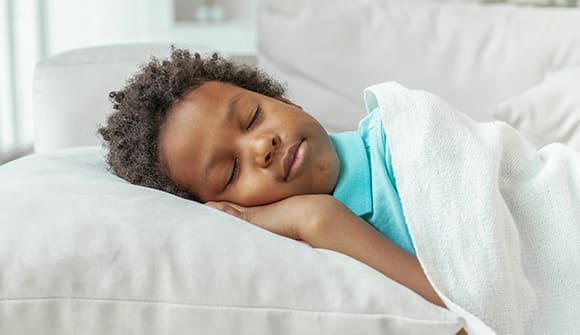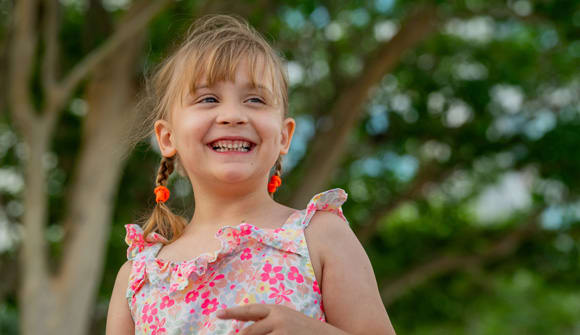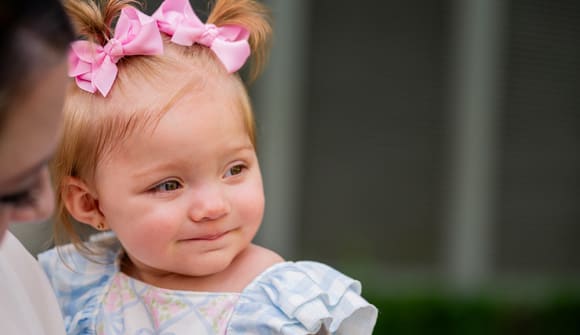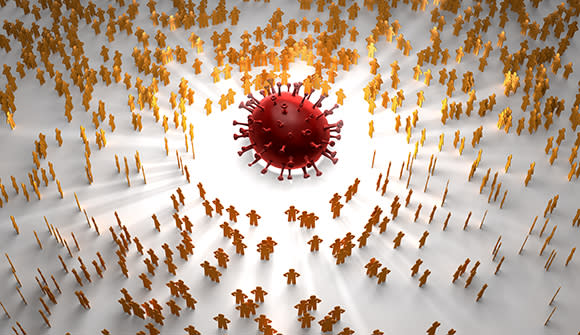Melatonin for kids?
What parents should know about the sleep supplement.
Article Date:

Has there ever been a parent who didn’t want their child to sleep longer or fall asleep more easily? Probably not. So, when people claim a supplement like melatonin can help children do just that – and it’s a compound that occurs naturally in the body, anyway – it feels like a giant win for tired parents everywhere.
But before you start doling out melatonin gummies each night before bed, Adam Rappoport, MD, director of the Pediatric Sleep Center at the Walter and Michelle Stys Neuroscience Institute at Wolfson Children’s Hospital and a pediatric neurologist with Nemours Children’s Health, Jacksonville, shared important information parents should know.
Does melatonin really work?
Dr. Rappoport said melatonin can be effective, but only when used to treat specific disorders.
“In the appropriate medical situations, it can be very helpful for children. It’s a very common treatment for childhood insomnia in addition to various circadian rhythm [body’s internal clock] disorders,” he said.
According to Dr. Rappoport, melatonin is a hormone your brain makes in response to darkness. Its main job is to help control when you feel sleepy and when you wake up. It doesn’t just knock you out, it works more like a clock, helping your body know when it’s time to wind down and go to sleep.
"The melatonin pathway is a natural timekeeper, rather than something that simply puts your body to sleep,” Dr. Rappoport said.
Is melatonin safe for kids?
While melatonin can be used safely, Dr. Rappoport emphasized that not all products are created equal, and parents need to do their homework and talk to their child’s pediatrician before choosing a supplement.
“I often caution patients that melatonin, like most sleep-inducing medications, might work. But if it’s effective, it can often be difficult to stop,” he said. “It’s common for melatonin to lose its effectiveness over time, leading to increased dosing and even adding or changing to an alternative medication.”
Parents should also be aware that not all melatonin products are created as advertised and could be mislabeled, which is why it’s always important to discuss it with your child’s doctor beforehand.
If your pediatrician recommends melatonin, look for a product with the U.S. Pharmacopeia (USP)-verified label. The USP is an independent nonprofit organization that measures the safety and quality of medicines.
Dr. Rappoport pointed out that melatonin, like any supplement or medication, can have unwanted effects.
“Common side effects include headache, dizziness, nausea and, of course, sleepiness,” he said.
Can children overdose or become reliant on melatonin?
Dr. Rappoport warned that melatonin is not without risk, especially when stored improperly.
“In 2020, melatonin became the most frequently ingested substance among children reported to America’s Poison Centers,” he said, adding that in rare cases, melatonin overdose can also lead to death.
According to the Centers for Disease Control and Prevention, from 2012 to 2021, the annual number of pediatric ingestions of melatonin increased 530% to 260,435. Pediatric hospitalizations and more serious outcomes also increased.
"Always talk to your child's doctor before starting any supplement. Treat things like melatonin as you would any other medicine: store it safely and keep it out of reach of children,” Dr. Rappoport said.
Does your child have trouble falling or staying asleep?
Experts with the Pediatric Sleep Center at Wolfson Children's Stys Neuroscience Institute can help. Call 904.697.3600 to schedule an appointment.



